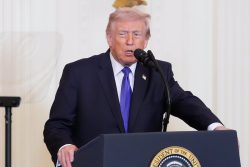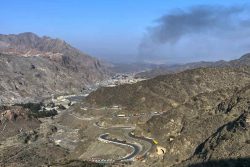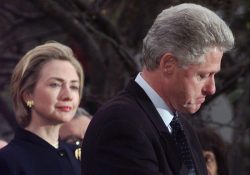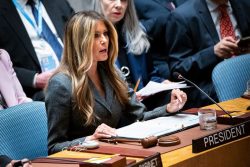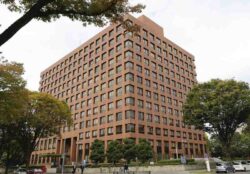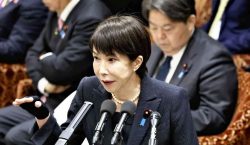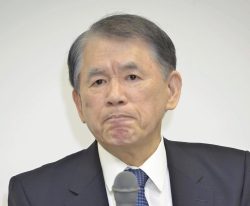India Hopes for Progress on Global Agenda as G20 Leaders Meet Despite Rifts Over the War in Ukraine
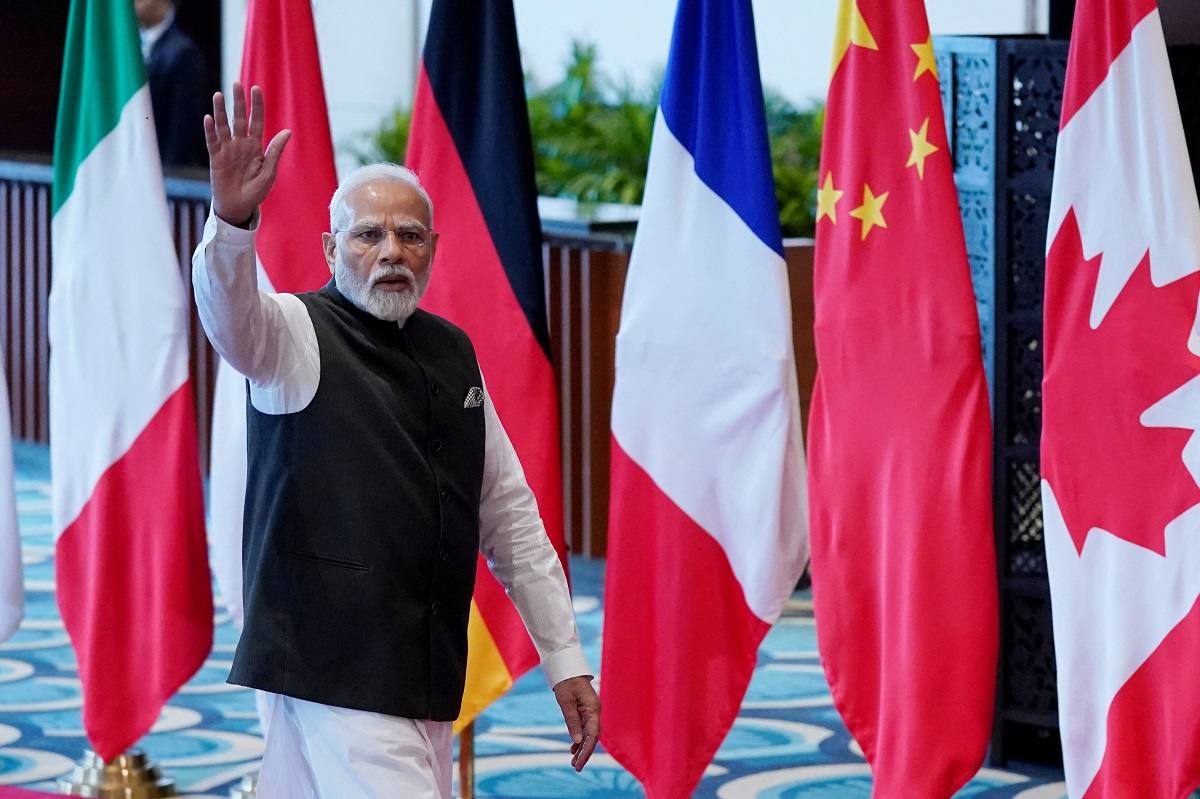
Indian Prime Minister Narendra Modi waves as he arrives at Bharat Mandapam convention center for the G20 Summit, in New Delhi, India, Saturday, Sept. 9, 2023.
13:32 JST, September 9, 2023
NEW DELHI (AP) — Leaders of many of the world’s biggest economies prepared to huddle in the Indian capital for the Group of Twenty summit Saturday, though growing global rifts and the absence of key players meant that reaching consensus on the thorniest issues could prove elusive.
At least a fifth of G20 heads were not in New Delhi. The leaders of Russia and China opted not to come, ensuring no tough face-to-face conversations with their American and European counterparts over multiple disputes, most acutely the war in Ukraine. Spain’s president couldn’t make it due to COVID-19, and Mexico’s president decided to miss it, too.
Host India hoped the proceedings would not be overshadowed by the European war. It wanted to devote more attention to addressing the needs of the developing world — though it is impossible to decouple many issues, such as food and energy security, from the Ukraine conflict.
Indian Prime Minister Narendra Modi has made giving voice to the Global South a centerpiece of this year’s summit.
While that may well get broad support, a series of preparatory meetings leading to this weekend’s meeting failed to produce agreements due to increasingly fractious rifts among the world’s global powers, largely due to differences over Ukraine. Ending the summit without such a statement would underscore how strained relations have become and tarnish the image Modi has tried to cultivate of India as a global problem solver.
Participants arriving in the Indian capital were greeted by streets cleared of traffic, and graced with fresh flowers and seemingly endless posters featuring slogans and Modi’s face. Security was intensely tight, with most journalists and the public kept far from the summit venue.
The group was expected to invite the African Union to join as a permanent member, and among the major topics on the agenda were issues critical to developing nations, including alternative fuels like hydrogen, resource efficiency, developing a common framework for digital public infrastructure and food security.
Countries were also expected to address reforming development banks like the World Bank and International Monetary Fund to help make funds more accessible for lower- and middle-income countries as they seek solutions to combat climate change, among other things.
India’s lead G20 negotiator, Amitabh Kant, told reporters that boosting climate action and climate financing were key priorities, particularly for developing and emerging markets.
“It was critical that we focused on multilateral organizations and how to redefine and reform them,” he said. “Our view was that Global South, developing countries, emerging markets must be able to get long-term financing.”
With so many other issues on the table, Human Rights Watch urged the G20 leaders not to let international disunity distract them at the summit.
“Political differences should not deter agreements on critical issues impacting human rights such as the sovereign debt crises, social protection programs, food security, climate change, or internet freedom,” said Meenakshi Ganguly, deputy director of the organization’s Asia division.
Ganguly added that members should not “shy away from openly discussing challenges like gender discrimination, racism and other entrenched barriers to equality, including with host India, where civil and political rights have sharply deteriorated under the Modi administration.”
The summit comes just days after Russian President Vladimir Putin said a landmark deal allowing Ukraine to export grain safely through the Black Sea will not be restored until Western nations meet his demands on Russia’s own agricultural exports.
The original deal had been brokered by the U.N. and Turkish President Recep Tayyip Erdogan, but Russia refused to extend it in July, complaining that a parallel agreement promising to remove obstacles to Russian exports of food and fertilizer hadn’t been honored.
Russia dispatched Foreign Minister Sergey Lavrov as its top representative to the G20. Erdogan himself was on hand in the Indian capital and others said ahead of the summit that they hoped to be able to find solutions, even as Russia’s military keeps up its attacks on Ukraine’s ports.
European Council President Charles Michel told reporters in New Delhi on Friday it was “scandalous” that Russia was blocking and attacking Ukrainian ports after terminating the grain deal.
“The Kremlin’s war is also unraveling lives far beyond Ukraine, including right here in South Asia,” he said. “Over 250 million people face acute food insecurity worldwide and by deliberately attacking Ukraine’s ports, the Kremlin is depriving them of the food they desperately need.”
British Prime Minister Rishi Sunak said he hoped to marshal international resources to counteract the impact of Russia’s moves on the global food supply. His government has announced London will host a global food security summit in November in response to Moscow’s actions.
Alternatives could include land routes or taking grain out of Ukraine by river barge.
Sunak’s government has also said Royal Air Force aircraft will fly over the Black Sea as part of efforts to deter Russia from striking cargo ships transporting grain from Ukraine to developing countries.
Hundreds of Tibetan exiles held a protest far from the summit venue to condemn Chinese participation in the event and urge leaders to discuss Sino-Tibetan relations.
Before the meeting got formally underway, Modi met with U.S. President Joe Biden shortly after his arrival Friday evening.
White House aide Kurt Campbell told reporters afterward that there was an “undeniable warmth and confidence between the two leaders.”
Leaders of the U.S., India, Saudi Arabia and the United Arab Emirates were working to finalize a joint infrastructure deal involving ship and rail transit between India and the Middle East to Turkey and beyond, in hopes it could be announced in New Delhi during the summit.
Campbell called the emerging deal a potentially “earth-shattering” project and said that “the strongest supporter of this initiative is India.” In the past, Campbell said, India’s leaders have had “almost a knee jerk reaction” to resist such massive multilateral projects.
“It’s the last moment that’s when things come together or they don’t,” Campbell said. “With huge, enormous ambitious deals it always comes to this place.”
As Biden made his way to New Delhi, U.S. administration officials sought to play down that Ukrainian Volodymyr Zelenskyy wasn’t invited to address the G20.
The Ukrainian leader has made regular appearances, virtual and in-person, at such international forums since the start of the war more than 18 months ago to rally allies to remain committed to support Ukraine.
Top Articles in News Services
-

Survey Shows False Election Info Perceived as True
-

Hong Kong Ex-Publisher Jimmy Lai’s Sentence Raises International Outcry as China Defends It
-

Japan’s Nikkei Stock Average Falls as US-Iran Tensions Unsettle Investors (UPDATE 1)
-

Japan’s Nikkei Stock Average Touches 58,000 as Yen, Jgbs Rally on Election Fallout (UPDATE 1)
-

Japan’s Nikkei Stock Average Rises on Tech Rally and Takaichi’s Spending Hopes (UPDATE 1)
JN ACCESS RANKING
-

Producer Behind Pop Group XG Arrested for Cocaine Possession
-

Japan PM Takaichi’s Cabinet Resigns en Masse
-

Man Infected with Measles Reportedly Dined at Restaurant in Tokyo Station
-

Israeli Ambassador to Japan Speaks about Japan’s Role in the Reconstruction of Gaza
-

Videos Plagiarized, Reposted with False Subtitles Claiming ‘Ryukyu Belongs to China’; Anti-China False Information Also Posted in Japan


